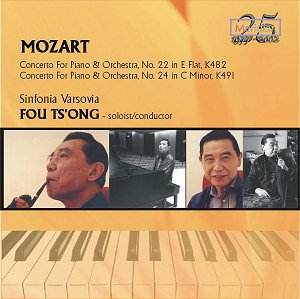At a time when we are told that classical music
doesn’t pay and the majors are all cutting right back to concentrate
on a mere handful of over-hyped artists, a small number of pianists
seem to have found an independent solution – that is to say a
tame record company – which lets them bring out pretty well what
they want. Joyce Hatto has been setting down a large portion of
her vast repertoire over the last decade for Concert Artist/Fidelio
(a label which has also preserved a wide range of the interpretations
of the late Sergio Fiorentino), Craig Sheppard has had a series
of his live performances come out on the AT label which, if I
have understood the set-up aright, has been created for the purpose
by his agent. Ivory Classics have been busy setting down the work
of the legendary Earl Wild, as well as that of Ruth Slenczynska
and several others, Golomb Records have promoted the art of Alexander
Tselyakov, Eroica that of Zeynep Ucbasaran. Nina Milkina will,
alas, be making no further records, but her son has obtained from
EMI the rights to some of her Pye recordings and issued them on
his Unterschrift label. And here on Meridian Fou Ts’ong has made
over a dozen albums, including two further Mozart couplings with
this same orchestra. It would be interesting to know the economic
results of these various projects, which are just a short list
from recordings I have actually had for review – there are others
around.
Fou Ts’ong, a Chinese pianist born in 1934, has
been a warmly regarded artist for as long as I can remember, indeed
longer than that, since he moved to Europe 50 years ago. The booklet
does not exaggerate when it says that his London recitals are
attended by some of the most famous pianists around, but somehow
the recording scene has never taken him up in a big way. A few
recordings were made quite early in his career, I think for Westminster
(they came out on World Record Club and there was a Mozart concerto
coupling with Brian Priestman on Music for Pleasure). There was
also a brief contract with CBS in the late LP era but that has
been about it. Until now.
These Mozart performances will be prized by those
who value Mozart for the combination of resigned sadness and Olympian
calm which lie beneath his rococo surface. Not that Fou Ts’ong
lacks brilliance or vitality, indeed, occasionally his performances
forge ahead of the tempo in a way that suggests a disarming spontaneity
rather than lack of discipline. However, the ultimate impression
is of an artist reaching for something deeper below the surface.
Conducting as well as playing seems to come very naturally to
him, for these performances are extremely well integrated. It
is noticeable that he is able to introduce a degree of expressiveness
in the slow movements – which are very slow – without losing sight
of the longer line and without suggesting an ill-placed attempt
at romanticising the music. Also his pedalling is rather more
liberal than we are told is ideal in Mozart, yet the results are
far from being an indistinct wash of sound and he never seems
to lose sight of Mozartian scale. As well as the gravely paced
slow movements, the finales are both very gently taken, with the
slower episode in that of K.482 magically still, quite without
the minuet character it is usually given (Peter Charleton cannot
have heard the performance when he wrote his otherwise useful
note). First movements flow at more "usual" tempi.
It should be clear now that this well-recorded
disc is very highly recommended if you are at all in sympathy
with this type of approach. It may be that you will seek something
altogether more brilliant, and some will want the fortepiano.
I hope my description will make it clear whether this could be
the approach for you, and I must say I hope it will be, for I
personally look forward to obtaining a great deal of future listening
pleasure from this disc.
Christopher Howell
